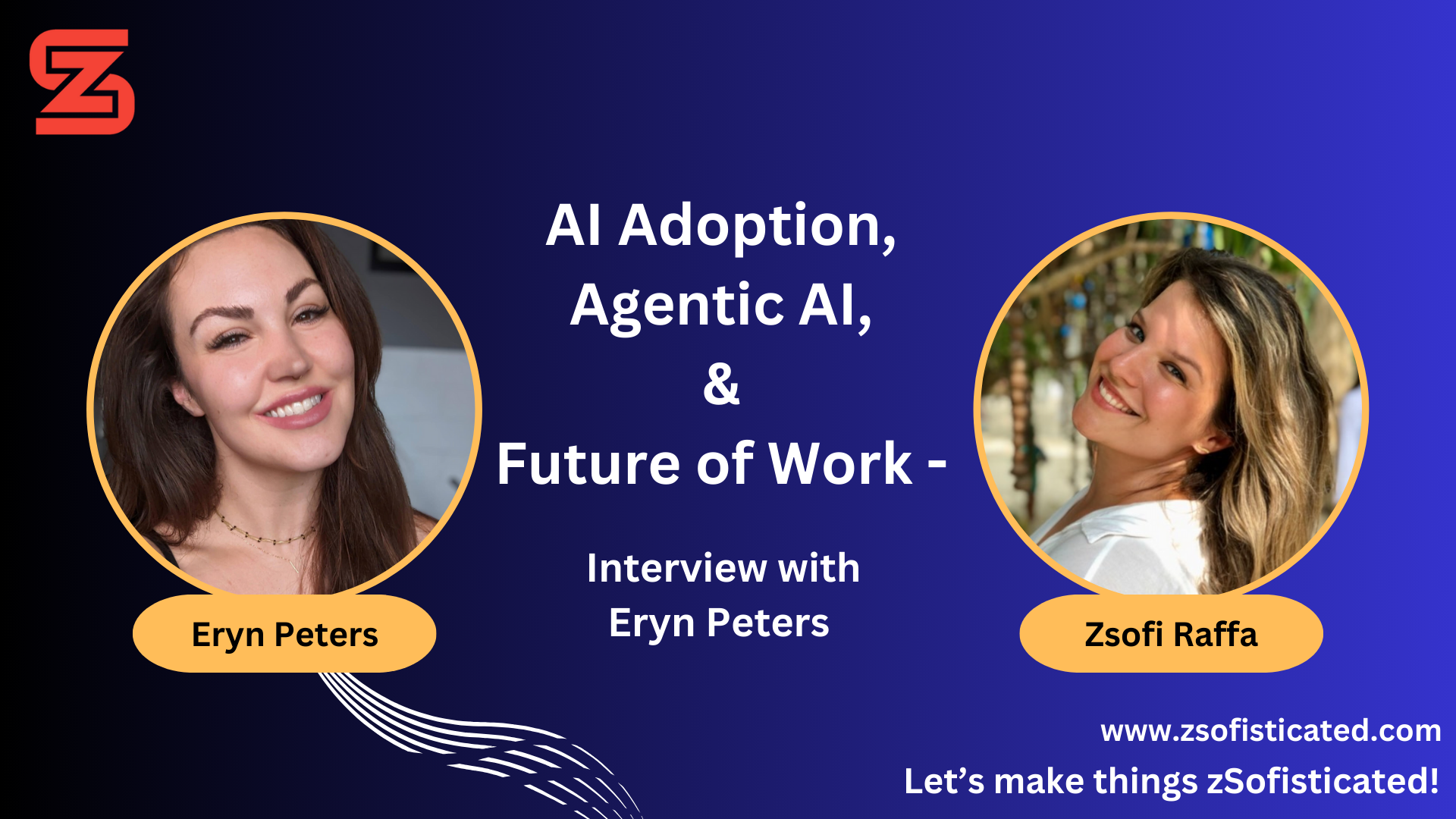Whether you’re a business leader taking your first steps into AI or just curious about its impact on your daily operations, understanding how to utilize its potential is no longer optional.
One name kept popping up in my LinkedIn feed: insightful posts, speeches on the Future of Work, and AI roundtables in Saudi Arabia. After seeing her third post, I knew I had to get to know her better. As luck would have it, we were both heading to the same conference in Qatar.

What started as a coffee-talk, short interview turned into a three-hour deep dive into the future of AI, surrounded by the hustle and bustle of Doha’s Souq. That’s where I had the pleasure of speaking with Eryn Peters, an amazing powerhouse Marketplace Nerd, Startup Advisor, and Community Architect. As the founder of Startup Consortium and Editor of Weekly Workforce, Eryn is driving innovation at the crossroads of technology and startups. A retired digital nomad who’s lived in over 50 countries, she’s passionate about tech, data, and democratizing opportunities in the digital economy.

As co-founder of AI Maturity Index, Eryn and her team are helping businesses map out their AI journeys by benchmarking their readiness and building adoption roadmaps. For any business leader looking to stay ahead, this tool is a true game-changer.
From Custom Solutions to Agentic AI
Historically, AI adoption began with simple tools like Google Search or basic automation systems. Some years ago, I used data and machine learning to convert website visitors into Lufthansa flight buyers as a Global Campaign Manager. Fast forward to today, and businesses are now having a crucial question: Should they stick with generalized solutions, or invest in more custom AI that aligns closely with their specific business needs?
AI is maturing, and companies are increasingly moving toward Agentic AI. The systems, which are not only learn from actions but autonomously make decisions within predefined frameworks. This evolution means AI doesn’t just “respond”; it actively participates in the decision-making process, becoming a real-time, invaluable asset to business operations.
Saudi Arabia: Leading the Way in AI Adoption
As Eryn explained, Saudi Arabia is emerging as a global leader in AI. With the AI Maturity Index steadily rising, the country is making significant strides to embed AI deeply into its decision-making processes. Government initiatives like the LEAP conference showcase how data-driven strategies are reshaping industries, from healthcare to finance, paving the way for a tech-driven future for businesses.

Transforming Routine Tasks into Lead-Generating Experiences
The impact of AI is most profound when it’s integrated into existing workflows. In large enterprises, AI can automate tasks like HR decisions or customer support FAQs, enabling systems to handle basic interactions, like automating emails or supporting cold outreach through conversational AI into personalized experiences and generating new leads.
While AI can perform repetitive tasks, humans remain responsible for overseeing decisions and validating outcomes.
Transform Data into Advantage and Future-Proof Your Business
Many businesses still rely heavily on human intuition rather than solid data. Based on my conversations with clients, one of the biggest barriers to AI adoption is that many companies don’t even know where their data is or how reliable it is.
Instead of relying on guesswork, tools like OpenAI and Perplexity are making it easy to analyze vast amounts of information, even for non-technical users. This shift is not only automating processes, it’s about enabling smarter, faster decision-making that drives a real competitive advantage.
But embracing AI requires change management. The rapid pace of AI advancements means businesses must create a culture of continuous learning; Eryn highlights. The impact on roles and responsibilities will be profound, and businesses must adapt by upskilling their teams.
While AI will reshape many jobs, the World Economic Forum’s Future of Jobs Report 2025 predicts that 170 million new jobs will be created by global macro trends this decade, while 92 million roles may be displaced, resulting in a net employment increase of 78 million jobs. This shift positions AI as an opportunity, not a threat, for those who embrace it.
AI Governance and Ethical Implications
As AI continues to evolve, so do its ethical implications. How businesses regulate AI – especially within AI-led organizations – will be crucial for ensuring these technologies benefit everyone. One of the biggest challenges is finding the right balance between AI governance and the flexibility needed for rapid innovation, as Eryn pointed out.
Companies often struggle with Shadow AI. These AI systems operate outside formal governance frameworks. This lack of oversight can lead to inefficiencies, compliance risks, and ethical concerns. “If businesses don’t establish clear AI policies,” Eryn said, “they risk losing control over how AI is used, creating blind spots in decision-making, security, and accountability.”
Businesses must address not only the ethical implications of AI but also the governance structures that ensure it is used responsibly and effectively.
Overcoming Challenges in AI Adoption
The journey toward AI adoption comes with its own set of challenges. From change management to ensuring employees have the necessary skills, businesses need to be prepared for the disruption AI brings. In Saudi Arabia, for example, the younger workforce is more open to embracing AI, creating unique opportunities for businesses to build a forward-thinking, AI-driven culture. Compared to Europe, where I see that the majority of businesses are busy with understanding the regulations and having fears how the data will be used.
To ease this transition, Eryn emphasized, “Businesses should invest in learning and development programs to ensure that employees at all levels are equipped to use AI tools effectively.” This includes everything from training on basic AI tools like ChatGPT to more advanced enterprise-level systems that automate complex processes. “It’s about empowering employees to use these tools confidently and strategically,” she added, underscoring the importance of upskilling as a key strategy for businesses to thrive in an AI-driven world.
Conclusion: AI as a Catalyst for Innovation and Growth
As AI continues to mature, its impact on business will only grow more profound. From automating tasks to enabling intelligent, data-driven decision-making, AI offers endless opportunities to enhance productivity, foster innovation, and fuel business growth. But for businesses to fully realize its potential, they must take a balanced approach—implementing AI thoughtfully, with careful attention to governance, ethics, and workforce transformation.
For business leaders, the key to success is to start small, experiment, and scale. Embrace AI not as a threat but as a partner that will help your business thrive in an increasingly digital and interconnected world. AI is not just a tool for the tech-savvy; it’s an essential part of the future of business—one that anyone can leverage, regardless of their technical expertise.
Will you be ready to make things zSofisticated?
📩 Stay up to date! Let’s make things #zSofisticated together! Subscribe to my newsletter for the latest AI trends and marketing insights: LinkedIn Newsletter or DM me for further consultation. More info: https://linktr.ee/zsofisticated
About the Author:

Let’s make things #zSofisticated!
Zsofia Raffa is a global digital marketing strategist with a journalist’s heart! With over 15 years of rocking the marketing world, she’s helped brands like Kodak, NVIDIA, Black Rock, and Lufthansa to shine digitally.
She’s all about turning data into stories that wow. As a regular newspaper writer, Zsofia knows how to make numbers turn into capturing attention. LinkedIn is her special field – she’s mastered the art of social selling, lead generation, and turning employees into brand ambassadors.

